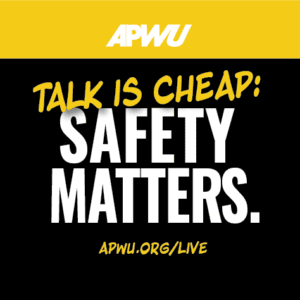September 12, 2019
Burnout: Signs, Symptoms, and Prevention
(This article first appeared in the September/October 2019 issue of the American Postal Worker magazine)
Burnout is a state of emotional and physical exhaustion caused by excessive and prolonged stress. People affected feel hopeless, powerless, emotionally exhausted, unable to cope, tired and down, and do not have enough energy. The unhappiness burnout causes can threaten your job, your relationships and your health.
How can you tell if you are experiencing burnout?
If the burnout expresses itself as irritability, you might find yourself always snapping at people. If the burnout manifests itself as depression, you might want to sleep all the time or always be “too tired” to socialize. You might turn to escapist behaviors such as drinking, drugs, partying, or shopping binges to try to escape from your negative feelings.
What is the difference between stress and burnout?
A person is normally aware of being under a lot of stress, but rarely notice burnout. Stress involves physical and psychological pressures. Stressed people normally feel better when everything is under control. When burnout occurs, they feel empty, devoid of motivation, and do not see any hope of positive change in their situations.
Most burnout has to do with the workplace. Many of us have days when we are bored with what we do at work: when our co-workers seem bull-headed; when dragging ourselves into work seems like a waste of energy, and when nothing we do appears to make a difference. However, when every day is a bad day, you are flirting with burnout.
What Causes Burnout?
The causes of burnout can be either work related or personal demands, such as:
- Working too much, without enough time for socializing or relaxing;
- Lack of close, supportive relationships;
- Taking on too many responsibilities, without help;
- Setting unrealistic goals for yourself;
- Not getting enough sleep;
- Working under strict rules;
- Boredom from doing work that never changes or doesn’t challenge you, and
- Feeling trapped, for economic reasons, to stay on a job that you hate.
Preventing burnout
Ensuring that you are in good physical health aids in preventing burnout. In addition, you should:
- Know your limits: Be realistic about how much of your time and yourself you can give, set limits, and communicate those limits to family members, and others.
- Connect with a cause or a community group: Joining a religious, social, or support group can give you a place to talk to like-minded people about how to deal with daily stress.
- Limit your contact with negative people: Spending time with negative-minded people who do nothing but complain will only drag down your mood and outlook.
- Practice healthy communication: Express your feelings to friends and family members who will listen, understand, and not judge.
- Cultivate positive relationships: Poor relationships and isolation can contribute to burnout, but positive relationships can help prevent or reduce its onset.
- Learn to relax and blow off steam: Exercise, play cards, go to a movie or out to eat with a friend.
In summary, recognizing your limited control of any given situation, and taking care of yourself emotionally and physically, can help you to avoid burnout. If you or someone you know is experiencing serious mental or physical symptoms, it is suggested that a physician, psychologist, or other mental health professional be consulted immediately.
Editor’s Note: Article heavily taken from “Preventing Burnout Signs, Symptoms, and Strategies to Avoid It” by Melinda Smith, M.A., Jeanne Segal, Ph.D., Lawrence Robinson, and Robert Segal, M.A. To read the full article, click here.



